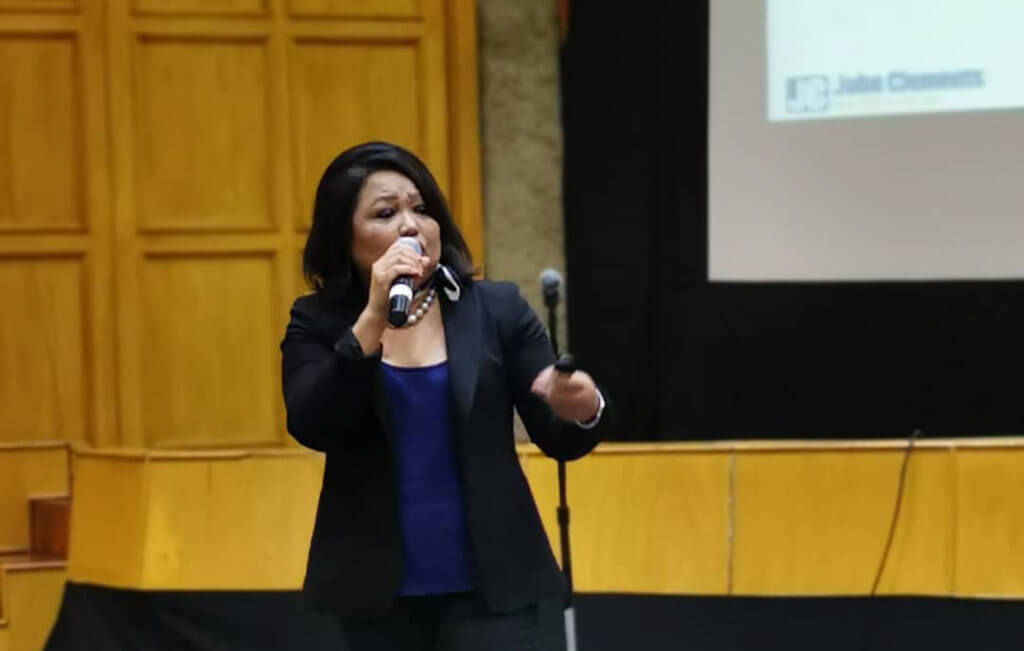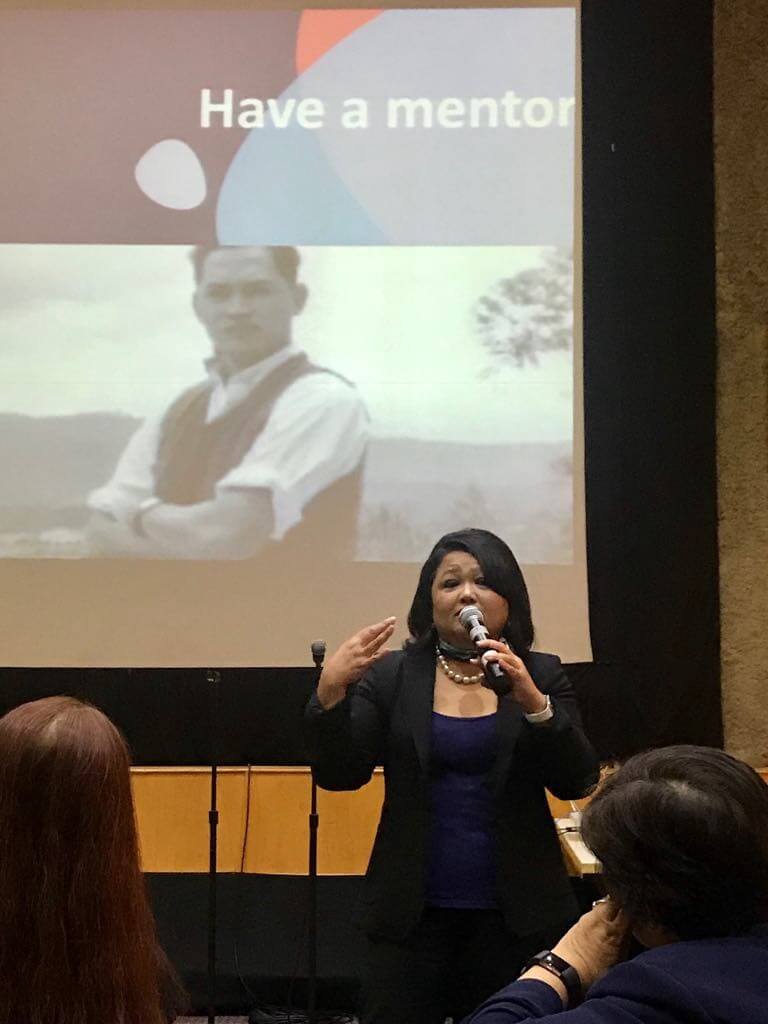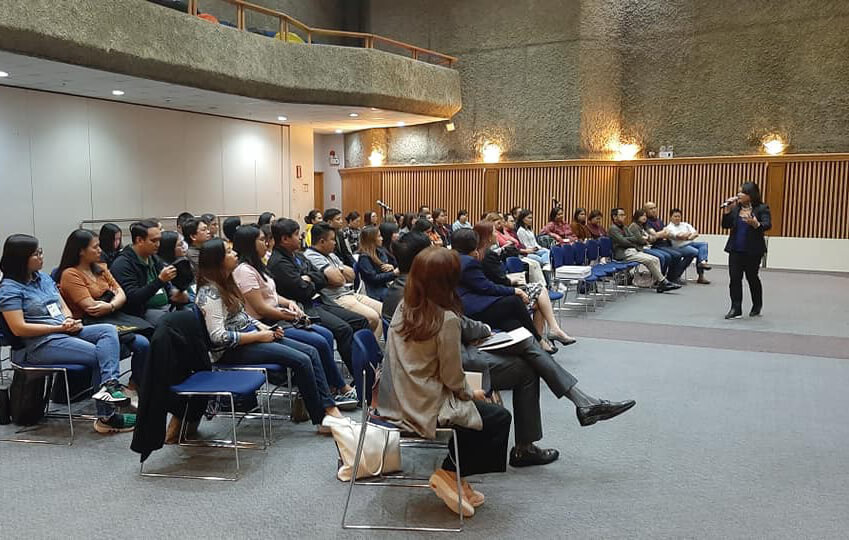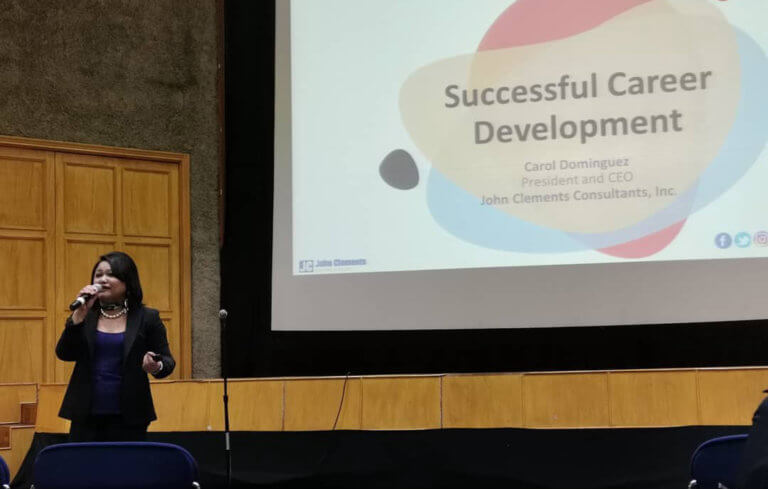With a career spanning over three decades, John Clements President & CEO Carol Dominguez would often get invited to speak at various events, where she would normally share her vast knowledge in HR, people management, leadership development, as well as career tips and advice. On one occasion where she was invited to become one of the featured speakers, Carol gave a rousing presentation on Successful Career Development to a rapt audience, drawing on her own experiences, struggles, and personal principles that ultimately led her down the path to success.
Here are some of the best career tips as shared by Carol in her inspiring speech below.
— — — — —
Good morning, everyone! Thank you for the great opportunity to be able to speak to you all today. I was given the brief to tell you a little bit about how I started my career, how I evolved and managed to stay relevant in today’s disruptive environment, and to share some stories that may inspire you to create your own careers and become successful. To tell you honestly, I’ve never thought much about my career—there is only one color in my light, and that is green. Always on the go! So, preparing for this talk gave me an opportunity to reflect on my career. It’s been a 32-year career: 10 different roles in two organizations—15 years at Citibank and 17 years at John Clements. I’ve worked in six cities—Manila, Chicago, NY, London, Milan, and Stamford CT—in three continents.
Let me try to give this a shot. As I reflected on my career, I thought of 10 guiding principles:

The first one is TO HAVE A DREAM.
When I was six years old, my parents took my younger sister and me on a trip to the U.S. We visited Honolulu, Ohio where my mother’s sister and father’s sister lived, and Boston to attend my father’s 10th-year reunion at Harvard Business School. The trip left a lasting impression on me and the desire to, at some point, study, live, and work in the U.S. My father always said that if we studied hard, we would get a chance to go to school in the U.S. someday.
I returned to Manila as a first grader and I could recall standing as a marshal while we were having our flag ceremony and national ceremony, and thinking that I was special.
10 years later, at 16, our family had another trip to the U.S. My sister became quite ill, so she and my parents stayed with my father’s sister while she got treated. My mother’s sister, on the other hand, invited me to attend my cousin Malu’s graduation from Barnard College at Columbia University in New York City. So, we went on an 8-hour road trip to NYC from Akron, Ohio.
I was mesmerized when I first saw New York City—bright lights, big city—and I thought to myself that someday I would live there.
— — — — —

Once you have a dream, you’ve got TO HAVE A PLAN.
As far as I can remember, I always had a plan. My goal was to study in the U.S. and live in New York City. But how would I ever get there?
My father said that if I studied hard, I would be able to study in the U.S. and live there. So, I studied a lot in grade school. I used to study at our dining room table and sleep there by putting three chairs together. My parents also got us tutors every day so we had no time to slack off. I used to read our encyclopedias during weekends. And on my 11th birthday, I asked for a microscope since I thought I was going to be a scientist. I was valedictorian of my grade school class.
With this goal in mind, I was focused to go to the top university in the Philippines, UP (much against my father’s wishes, since he went to De La Salle). My mindset even then was that if I went to a top university, I had a greater chance of landing a good job at a multinational corporation and getting accepted into a top business school, and hopefully, land a job in NYC.
At UP, I got a bit distracted in my first and second years in college and managed to get myself kicked out of the accounting program. I thought, ‘Oh no, how would I reach my dreams with my crappy grades?’ I set a plan to graduate cum laude despite entering the college of business with a 2.0 average. I entered the class on the first day and thought to myself, ‘Who were the smartest people in the room and how can they be my friends?’ I became friends with the high school valedictorians of Poveda, Assumption, and Maryknoll, and ended up graduating cum laude.
This enabled me to land a job as a management associate for Citibank, where they rotate you to different units of the bank. After two years at Citi, I got accepted into NU’s Kellogg Graduate School of Management. After Kellogg, Citi NY rehired me, I got cross-posted to Citi London and Citi Milan, and I made it to VP in 7 years.
— — — — —
Aside from the plan, I think it is very important TO HAVE A MENTOR.
How many of you have mentors? I was very fortunate to have my father as my mentor—and also a tormentor.
As I mentioned earlier, he always encouraged us to study hard and work hard in order to become successful in life. When I was looking for a job after college, he insisted that I find a job as a management trainee in a large, multinational organization. He said that they move you from one department to another and you will learn the business much faster and, therefore, get promoted much faster as well. So, I ended up taking a job as a management trainee at Citibank.
After my first year at Citibank, I found myself having so much fun going out to parties every night with my colleagues. My father often asked me, “How could you stay out late every night and go to work and focus in the morning?” The perks of being young! Finally, one day, he had it with all my kalokohans and said that it was time to get serious and go back to school to take an MBA.

My parents took me on a trip to the U.S. to visit about half a dozen schools—we went to Boston and visited Harvard Business School. My father even arranged for me to sit in some classes and I thought that the students were very intense and the environment was very competitive. Then we visited New York, the city of my dreams. We went to Columbia University and I decided that NY was my first choice—oh, how I loved the city! But my father said that if I studied in NY, he would not pay for my education because I would just get distracted. Oh, well.
So, we went to visit the West Coast—Stanford, UCLA, and UC Berkeley. But I remembered that an ex-boyfriend was studying in the area, so I didn’t want to be there! On our way to California, we decided to get off the plane and stop for a couple of hours in Chicago. We took a train to Evanston and visited the beautiful Northwestern campus and we all fell in love with it. My father thought that Kellogg did not seem as intense, and Midwest folks tend to be friendlier than East West folks. The curriculum fostered more collaboration and teamwork than most business schools. Also, Evanston was an hour away from Chicago—it was close enough, but not too close, so I would not be distracted.
I went back to Manila and my father enrolled me in a GMAT course to study for the exams. He bugged me every day to study and made sure that I worked on the applications and sent them on time.
I finally got accepted into Kellogg. Before I boarded the plane to Chicago, my father pulled me aside and said, “If I catch you doing anything immoral, I will cut you off.” Oh, wow.
During the fall semester, my father visited me. He read my case studies and even attended my classes. My mother got irritated and told him, “Why don’t you just enroll with her and take a renaissance MBA?”
When I graduated in 1987, it was very difficult to get a job because of the financial crisis, and not having a U.S. visa. My father told me that I should just keep on applying, so I sent out 200 applications and I had 100 interviews. Can you believe that? In Chicago, if you showed your ‘ding’ letter (rejection letter) at a bar, you would get a free drink—I had so many free drinks! I was so desperate to get a job in New York that I even asked my classmate if he would marry me so I could get a green card.
Finally, in the spring of 1989, I received an invitation for a second round of interviews at Citibank NY. I flew to NY for spring break, got interviewed, and landed that job. I thought, ‘Wow, dreams do come true! Now I could live happily ever after.’

But working at Citibank in NYC was more challenging than I thought. It was a daunting task to climb the corporate ladder as a management associate. It was very tough and incredibly competitive. I soon realized that there was a hierarchy in the corporation. At the top you had the male WASP—white Anglo-Saxon Protestants, they called it. Below that, you had the non-white males, then the white females. Then finally all the rest, including Asian women, cats, dogs, and cockroaches. I was known as the sweet and subservient Asian woman who worked hard but doesn’t speak up, so everyone took credit for my work and often got promoted faster.
I was miserable. I felt like I hit the glass ceiling. Oftentimes, I spoke with my father and told him that I wanted to return back home, but he said it was worse in the Philippines—there were lots of brownouts and almost no economic growth in the early 90s. He advised me to hang in there and be patient and find opportunities. And he was right.
One day, I was sent to London to work on a project. There I met some wonderful colleagues, one of whom became another mentor—Paula Sestito. The folks at Citibank London gave me a break and invited me to join them and work there. At first, my bosses in NY did not allow me to move. But after a year, I told them that if they did not allow me to move to London, I would quit anyway and just transfer to London. Finally, they allowed me and my career took on a new twist.
I shone in Europe and moved up the ranks quickly. It was great to have a woman mentor who helped me—not only providing guidance on how to navigate my career, but pushing for me. She invited me to move to Citibank Milan and promoted me to VP after 7 years, which is not a bad achievement.
So, it really pays to have a mentor.
— — — — —
My fourth guiding principle is TO BE AUTHENTIC.
I had the opportunity to listen to the “Crucibles of Leadership” by author Robert Thomas, who said that what matters most is what one makes of experiences, particularly the traumatic and often unplanned crucible events that challenge one’s identity as a leader. What distinguishes leaders who grow through a crucible experience? Their approach to learning.
I was at the height of my career at Citibank Milan when one day, I started bleeding profusely. I went to see a doctor, got checked into the hospital, and never went back to work again. I had a DNC that evening. The doctors came to me after and told me that I had lost a lot of blood and needed a blood transfusion. Knowing the Italians, I thought that the blood would not be good, so I refused to take it. The next morning, the doctors came back and said that they found a tumor in my cervix and I really needed to get that blood transfusion. And I thought, ‘Cancer versus AIDS— here, take my arm’.
I was diagnosed with stage 3 cervical cancer. I asked my doctors what the cause of the cancer was, and they said bad luck. I thought, ‘Get me out of here.’ So, I went back to the U.S for treatments, where I found out I was misdiagnosed in Milan. The cancer turned out to be stage 1B. I had a radical abdominal hysterectomy and went through 6 months of chemo and 30 days of radiation. Fortunately, Citibank gave me a job in Stamford, CT, close to NYC. Two months after my last chemo, they found a nodule in my lungs and the doctor thought it was just granuloma. Three months later, I had another CT scan and the nodule grew to a centimeter. So, I had a fine-needle aspiration and the results showed that it was a metastasis to my lung. Pretty heavy stuff, huh?
At this point, my father said that I was the only one who could heal myself and that I should devote all my energies to finding a solution to my illness, which is what I did. I Googled top cervical cancer hospitals in the U.S. and saw Memorial Sloan Kettering, MD Andersen, and Johns Hopkins. My sister and I visited these hospitals and got several opinions before deciding on Memorial Sloan Kettering, where I had thoracic surgery. They took out a lobe from my lung.
Two weeks after the surgery, I seemed to be healing well and was ready to go back to work. But one of my friends, like my father, encouraged me to spend time figuring out where all these diseases were coming from. So, I spent a couple of months researching alternative medicine and found a macrobiotic diet, which seemed to place people in remission. I practiced yoga, I organized prayers at my apartment every day, I went to see a homeopath, and I went to Lourdes. I really wanted to figure this out.
Although this was a terribly traumatic experience, it has taught me to learn from it. To be strong, to never give up, to always cast a wide net and find solutions. Most of all, when you are faced with two near-death experiences, you think that nothing can faze you, that everything is solvable, and you become authentic. You cut through the noise and just focus on what is important.
— — — — —

Which leads me to my next point, which is TO HAVE A PURPOSE BEYOND ONESELF.
How many of you have a purpose beyond yourself?
For any leader at any level in any organization, clarity of purpose is a critical ingredient of success. You must know where you’re headed, and why you’re headed there. A compass provides the ideal metaphor. Just as a compass points toward a magnetic field, your personal “true north” directs your path and pulls you forward.
I had the opportunity to attend a class with Prof. Bill George, who talked about finding your true north. Bill said that in order to find your true north, you need to understand your life’s story. He gave examples like Starbucks CEO Howard Schultz, who offers health insurance to all his employees, whether they are part-time or full-time. Do you know why he does that? It so happened that Howard grew up as an unprivileged child—his father was a truck driver. One winter, his father had an accident and slipped. He did not have any health insurance since their family had no money. So, Bill vowed to provide health insurance to all his employees.
Or how about Oprah? How many of you know that Oprah was raped as a child, and was a battered wife? This is why she is involved in foundations that protect and help children, unwed women, and battered wives.
My personal passion is to help build the Philippines, to make it a greater country than it is today. I was a Martial Law baby and never thought that we would ever experience the kind of economic development we are experiencing today. In one of the workshops I attended, we were asked to reflect on what our passions are, and why. I often wondered myself why building the Philippines is such a great passion for me, when frankly I do not consider myself very nationalistic. I don’t have Filipiniana clothes, I am not fond of Filipino food, and I can barely keep up with national issues in the country and all the government politicking. So, I had to search deep within myself.
Then I recalled my years living in Milan, where 99.9 percent of Filipinos were helpers. Don’t get me wrong—I have nothing against domestic helpers, they are national heroes. But when you live in a country where you are discriminated every day, where your clients ask you where you are from and you tell them that you’re from the Philippines, and they say, “Oh, we love Filipinos! They cook so well, clean so well, take care of our children. They are very honest.”
Or when the sister of your ex-fiancé asks you to visit her in Bologna so you can talk to her Filipino helper who can’t speak English. I took a two-hour train ride to Bologna from Milan to meet the helper, where I found her ironing curtains, underwear, and stockings. I told her, “Ang tiyaga tiyaga mo naman. Ako nga hindi marunong magplantsa.” (You are so patient in ironing. I don’t even know how to iron.) And she asked, “Bakit, linis ka lang?” (Why? Are you only a cleaner?)
Or when an office colleague invites you to their home and you think, ‘Wow, they are finally warming up to me.’ And when you arrive, they ask you to speak to their Filipino helper who wants to return to the Philippines. Or when one of your good friends from Manila decides to take her MBA at Bocconi University in Milan, and she calls one day and says she wants to eat Filipino food. So, I told her that we can go to a Filipino restaurant that evening, but not to act burgis (arrogant) because we would be surrounded by domestic helpers there. We had a fantastic dinner and after the meal, many of the Filipinos came up to us to introduce themselves. They asked us when we arrived in the country, and whether we were “live-in” or “stay-out” Filipino helpers.
I think that if you go through these every day for two years, something happens to you subconsciously. I guess because of this experience of feeling discriminated, I want to do everything I can to help build our country and provide jobs to Filipinos here, so they don’t need to leave and become a domestic helper abroad. I also would like to show the world that there is more to the Philippines than domestic helpers. We have many talented people in our beautiful country and we should continue to educate the world about our people and attract more foreign direct investments into our country.
Having said that, I would encourage you all to:
- Find purpose in your life story
- Embrace your life’s crucibles
- Constantly seek feedback
- Develop a practice of self-reflection
- Transform from “I” to “We”
— — — — —
In addition to finding a purpose that belongs to yourself, it is equally important TO KNOW YOUR STRENGTHS.
How many of you have taken a 360-degree assessment? I underwent a Zenger Folkman 360-degree assessment a few years ago. ZF uses 16 competencies and compares you to the global standards of extraordinary learners. Nobody is perfect, but if you have at least three competencies that are above the 90th percentile, and you do not have fatal flaws that directly affect your job, you are characterized as an extraordinary leader. For example, we all know that Steve Jobs was an extraordinary leader, but I am sure he would rate very low in some of these competencies. Based on my ZF results, they have identified three competencies above the 90th percentile, which are:
- Innovates
- Open to change
- Connects to the outside world
Of course, I have also focused on areas that needed improvement, such as builds relationships, collaborates, and teamwork. I have been working towards listening to other people’s ideas more, and collaborating, since I used to be more of a listen-to-my-idea, highway type of leader.
— — — — —

This leads me to the next guideline, which is to CONTINUOUSLY LEARN.
Peter Drucker said that learning is a lifelong process of keeping abreast of change, and the most difficult task is to teach people how to learn. How many of you have learning organizations? When was the last time you went to a leadership program?
I am proud to say that this is one of our ‘secret sauces’ at John Clements, and I have some colleagues out here today. We have a ladderized leadership development program at John Clements, where:
- We send ALL new employees—whether they are part-time, outsourced or permanent—to the Breakthrough Development Program or regular Harvard Manage Mentor cafes;
- Then we have the first-level managers program for new managers that teaches them to move from an individual performer to a supervisor;
- Then we have a mid-level managers program;
- Which then leads to our internal executive MBA program for our senior leaders, and most recently even high potentials. During the past two years, we’ve focused our EMBA toward topics on digital disruption, fintech, and most recently, AI and big data.
Basically, we use Harvard Business School case studies and articles and blend them with online learning tools such as HMM to develop leadership skills. As part of this, we are putting a formal succession planning program in place, where we have identified successors and developed individual development plans for each to help them move to the next level.
— — — — —
As a result of all this, you need to then BUILD YOUR UNIQUE BRAND, and continue to focus on it so you and opportunities can feed off each other.

— — — — —
Of course, one principle that most of us overlook is NETWORKING. You don’t know where your next job or career opportunity will come from. Remember, I got those job movements from Citibank just by networking among my colleagues.
One of my friends calls me ‘the shameless networker’. How many of you are constantly networking? I brought my team here today—I hope you don’t mind, so they can network with you. All of our sales people are mandated to attend at least one networking event every week. They need to post their learnings on social media, present these at our Monday morning sales meeting, and write an article that gets posted on social media.
— — — — —
Finally, as Martha Stewart said, BE COMFORTABLE IN YOUR OWN SKIN. The longest relationship we will ever have is with ourselves. Always honor yourself.

Carol hopes her 10 guiding principles will inspire and encourage people to start down their own career path to success.
To read more articles about career tips and advice from our leaders, please visit JC Lookingglass.





